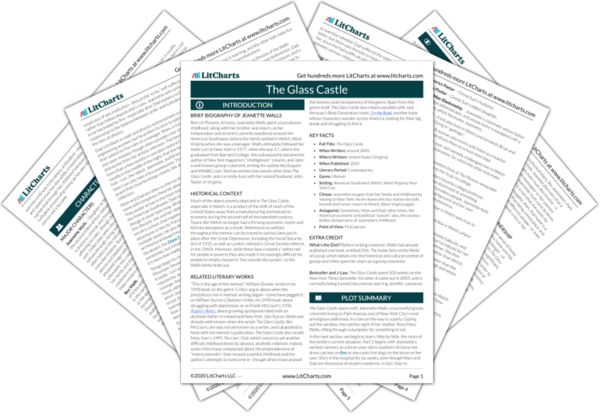The hazy point at which fire and smoke reaches into the air fascinates Dad, who calls it “a place where no rules apply, or at least they haven’t figured ‘em out yet.” It is this intermediate realm that the family inhabits, that Jeanette’s parents seek to inhabit, where the rules are grey and they can therefore define their own way of living and being. For a time, living “on the edge” seems to work for them. But once they settle down for good in West Virginia, their more “orderly” lifestyle leads, ironically, to greater turbulence. At the same time, order means different things for different people in the book, based on their particular characteristics: what Jeannette understands as disorder, for instance, Mom sees as “adventure.”
Even as Jeannette attempts to establish her own kind of order against her parents’ turbulent lifestyle, the book suggests at times that order and turbulence may work in tandem rather than in opposition. As Mom tells Jeannette about a certain gnarled tree in the desert, “It’s the Joshua tree’s struggle that gives it its beauty.” Jeannette’s childhood turbulence, if not always what she desired, therefore becomes deeply influential in helping her to figure out what kind of order suits her best.
Order and Turbulence ThemeTracker

Order and Turbulence Quotes in The Glass Castle
That was the thing about the hospital. You never had to worry about running out of stuff like food or ice or even chewing gum. I would have been happy staying in that hospital forever.

Unlock explanations and citation info for this and every other The Glass Castle quote.
Plus so much more...
Get LitCharts A+I wondered if the fire had been out to get me. I wondered if all fire was related, like Dad said all humans were related, if the fire that burned me that day while I cooked hot dogs was somehow connected to the fire I had flushed down the toilet and the fire burning at the hotel. I didn’t have the answers to those questions, but what I did know was that I lived in a world that at any moment could erupt into fire. It was the sort of knowledge that kept you on your toes.
Mom frowned at me. “You’d be destroying what makes it special,” she said. “It’s the Joshua tree’s struggle that gives it its beauty.”
[Dad] pointed to the top of the fire, where the snapping yellow flames dissolved into an invisible shimmery heat that made the desert beyond seem to waver, like a mirage. Dad told us that zone was known in physics as the boundary between turbulence and order. “It’s a place where no rules apply, or at least they haven’t figured ’em out yet,” he said.
Dad kept telling me that he loved me, that he never would have let me drown, but you can’t cling to the side your whole life, that one lesson every parent needs to teach a child is “If you don’t want to sink, you better figure out how to swim.”
“I swear, honey, there are times when I think you’re the only one around who still has faith in me,” [Dad] said. “I don’t know what I’d do if you ever lost it.” I told him that I would never lose faith in him. And I promised myself I never would.
Because we never subscribed to newspapers or magazines, I’d never known what was going on in the world, except for the skewed version of events we got from Mom and Dad—one in which every politician was a crook, every cop was a thug, and every criminal had been framed. I began to feel like I was getting the whole story for the first time, that I was being handed the missing pieces to the puzzle, and the world was making a little more sense.
“Why do I always have to be the one who earns the money?” Mom asked. “You have a job. You can earn money. Lori can earn money, too. I’ve got more important things to do.”
I stared at the plans. “Dad,” I said, “you’ll never build the Glass Castle.”
“Are you saying you don’t have faith in your old man?”
“Even if you do, I’ll be gone.” […] “As soon as I finish classes, I’m getting on the next bus out of here. If the buses stop running, I’ll hitchhike. I’ll walk if I have to. Go head and build the Glass Castle, but don’t do it for me.”
“You can’t just live like this,” I said.
“Why not?” Mom said. “Being homeless is an adventure.”
“I think that maybe sometimes people get the lives they want.”
“Are you saying homeless people want to live on the street?” Professor Fuchs asked. “Are you saying they don’t want warm beds and roofs over their heads?”
“Not exactly, I said. I was fumbling for words. “They do. But if some of them were willing to work hard and make compromises, they might not have ideal lives, but they could make ends meet.”
Professor Fuchs walked around from behind her lectern. “What do you know about the lives of the underprivileged?” she asked. She was practically trembling with agitation. “What do you know about the hardships and obstacles that the underclass faces?”
I liked to go for long walks at night. I often walked west toward the river. The city lights obscured the stars, but on clear nights, I could see Venus on the horizon, up over the dark water, glowing steadily.
“We should drink a toast to Rex,” John said.
Mom stared at the ceiling, miming perplexed thought. “I’ve got it.” She held up her glass. “Life with your father was never boring.”
A wind picked up, rattling the windows, and the candle flames suddenly shifted, dancing along the border between turbulence and order.











